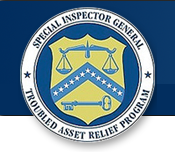Report Rips Treasury Dept. For Giving Out Raises To Execs At Bailed-Out Companies

SIGTARP was not terribly thrilled with the Treasury’s handling of executive pay at AIG, GM, or Ally.
In her report [PDF] to Treasury Secretary Timothy Geithner, Special Inspector General Christy Romero writes that “once again, in 2012, Treasury failed to rein in excessive pay.”
Romero calls out the Treasury’s Office of the Special Master for TARP Executive Pay Compensation for what she believes were unwarranted approvals of pay packages and bonuses.
According to her report, that office approved pay packages of at least $3 million or more than half of the 69 highest-ranking employees at AIG, General Motors, and Ally Financial combined. Of those 69 execs, 16 had pay packages worth at least $5 million, while 21 of them earned (or rather, were paid) between $3 million and $4.9 million. All but one of those 69 highest-ranking employees earned at least $1 million in 2012.
Romero writes that she had “previously warned that Treasury lacked robust criteria, policies, and procedures to ensure” that previously established guidelines for curbing excessive pay are met. “Treasury made no meaningful reform to its processes. Absent robust criteria, policies, and procedures to ensure its guidelines were met, OSM’s decisions were largely driven by the pay proposals of the same companies that historically, and again in 2012, proposed excessive pay.”
Additionally, the folks at OSM approved every one of the 18 requests (totaling $6.2 million) it received for pay raises at these three companies. Most of these were for at least $100,000, writes Romero. The CEO of AIG’s Chartis subsidiary, which sells, among other things, “reputation insurance” for companies facing huge PR disasters, got a $1 million raise. Meanwhile, one employee at AIG’s ResCap subsidiary scored a $200,000 raise only weeks before that company filed for bankruptcy.
“OSM’s written explanations for the pay raises lacked substance, largely parroting what each company asserted to OSM without any independent analysis by OSM,” reads the SIGTARP report.
The previous Special Master had set a cap on cash salaries for these top executives at $500,000 and put large chunks of compensation in company stock so that these execs would have good reason to get the companies back on their feet and out from under taxpayer conservatorship. He said that any salaries exceeding that amount should have to show good cause.
But the current Special Master seems to have disregarded this guideline.
“Never have there been so many exceptions to the $500,000 cash salary guideline,” writes Romero.
According to SIGTARP, 48 of those 69 high-ranking suits are at or above the $500,000 mark, with only four of them earning under $450,000 a year in cash compensation.
In her response to these concerns, the Acting Special Master described these pay levels as “utterly normal” for executives at other banks.
Responds SIGTARP: “That might be true if the companies had not been bailed out and were not still significantly owned by taxpayers.”
The Acting Special Master also apparently told Romero that, in spite of her predecessor’s on-the-record statements about having to show good cause for crossing the $500,000 threshold, she did not it would take an “independent
little project” to determine if an executive should earn more than $500,000.
“If the pay czar is not even willing to independently analyze high cash salaries for 23 employees, who else will protect taxpayers?” asks Romero.
AIG has recently finished repaying the $182 billion it received from TARP, while GM owes $21.5 billion of its original $49.5 billion bail-out and Ally still owes 66% ($11.4 billion) of the $17.2 billion loaned to it by taxpayers.
Want more consumer news? Visit our parent organization, Consumer Reports, for the latest on scams, recalls, and other consumer issues.

